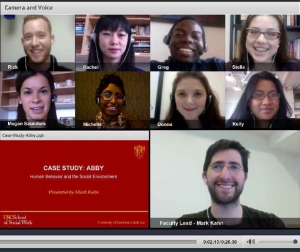Online Graduate Education Grows at USC
March 05, 2014 / by Merrill Balassone- Students
For Janessa Hatch, being a Trojan meant she never had to miss a class, despite moving with her family from Utah to Georgia and then Alaska.
Hatch is working toward her USC master’s degree in social work online. The program boasts the largest enrollment — 1,900 current students — of USC’s online offerings.
“It was an opportunity to attend live classes from a top social work program from virtually anywhere,” said Hatch, whose husband is in the military. Hatch has worked with refugees in Salt Lake City and provided services in Haiti after the devastating 2010 earthquake.
“I realized that the social work field allowed me not only to provide mental health services but to be a catalyst for social change,” she said.
In his recent address to faculty and staff, USC President C. L. Max Nikias said that while online education is shaking up higher education, USC is leading the way in creating a graduate online education model that’s both academically rigorous and financially viable.
Altogether, USC’s online education programs reach 7,600 students in more than 40 countries through graduate-level degree programs and executive and continuing education programs. Several of the newest degree offerings are in the fast-growing health care field, including master’s degrees in public health, applied psychology and health administration. Nikias said the university plans to double its online enrollment within the next five years.
USC pioneered distance learning 40 years ago, when the USC Viterbi School of Engineering used microwave technology to beam courses to engineers across Southern California.
Last fall, USC Viterbi again led the way as it launched a new Master of Cyber Security degree. Serving as faculty are world leaders in cybersecurity and cryptography hailing from top government agencies, the military and private industry.
The impetus for providing high-level cybersecurity education is clear, said Winnie Callahan of USC Viterbi, as some of the largest cyber hacks in history recently have hit top retailers and the highest levels of the U.S. government.
“Cybersecurity is truly one of the greatest challenges of our time,” said Callahan, associate director of the informatics program. “It’s a field that, frankly, if you want job security, here’s something you should get into.”
USC’s social work program has also seen a surge in demand as national mental health issues have been given new focus in the wake of tragedies such as the shootings in Newtown, Conn., providing opportunities for social workers. Students also are interested in the degree with a concentration in military social work in order to help as the 2.6 million Americans who have served in Afghanistan or Iraq come home.
“We’ve had phenomenal growth,” said June Wiley, director of USC Social Work’s Virtual Academic Center. “There’s an even greater demand today for social workers who can work with a variety of populations, especially military veterans, people living with mental illness and the baby- boom generation who are retiring and demanding more social services.”
For Hatch, learning online has taken only one small adjustment.
“Making sure I take enough time away from the computer to get exercise and go outside,” Hatch said. “After spending so much time on the computer, it is nice to give my eyes a break and get some fresh air.”
About Digital USC
Digital USC is a university-wide initiative of $1 billion over 10 years going toward gathering, interpreting and applying digital data on a massive scale. An international leader in fields from artificial intelligence to game design, with the largest computer science research program among American universities, USC is advancing knowledge in the development of virtual humans for therapy, entertainment or historic preservation; the simulation and modeling of earthquakes and other complex systems; brain mapping; archiving, indexing and analysis of visual material; visual storytelling and data visualization; and in creating advanced online platforms for distance education and professional development.
To reference the work of our faculty online, we ask that you directly quote their work where possible and attribute it to "FACULTY NAME, a professor in the USC Suzanne Dworak-Peck School of Social Work” (LINK: https://dworakpeck.usc.edu)
